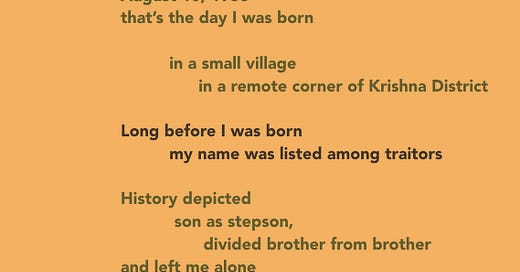"A well known Muslim Telugu poet. He cuts through the currrent fashions of literary style and directly presents the collective experience of Indian Muslims.”
- Velcheru Narayan Rao (From Twentieth Century Telugu Poetry: an anthology)
What makes the experience universal is not a rhetoric characterised by epic generalisations, but Mohiuddin’s readiness to undress the wound, calibrate his pain for his readers, and temper his anger with satire. This poem must be read in its entirety, and I will soon be sharing the full poem on poetly after the second set of excerpts tomorrow.
Mohiuddin’s poem hit me in the gut. Every day we read about the inhuman treatment of Muslims in the country. I have seen first hand the violence that police have inflicted on innocent, poor Muslim men in the nation’s capital. Mohiuddin’s poetry emerges from the same soil of discontent and rage. His words become a window into the wide gap between the individual and the state - a gap closed by violence, and the absurdity of the “fiction” and “slander” that is discrimination on the basis of religion. The poetry emerges from a bitterness that makes large furrows in the barren field of this democracy. It outlines the uneasy relationship of a state with its people. There is no respite in his fervent letter to the republic, only a gradual but firm reassertion of identity and belonging.
There is a lot of poetry being shared around as the state revs up its engine of hatred. When people are confused by one kind of abstraction, they turn to another - another that they can feel, and own. Mohiuddin’s poetry exposes the welts on the body politic of the country. His poetry of resistance gives hope and strength. But it is also a bookmark in the annales of collective memory.
NEVER FORGET.






